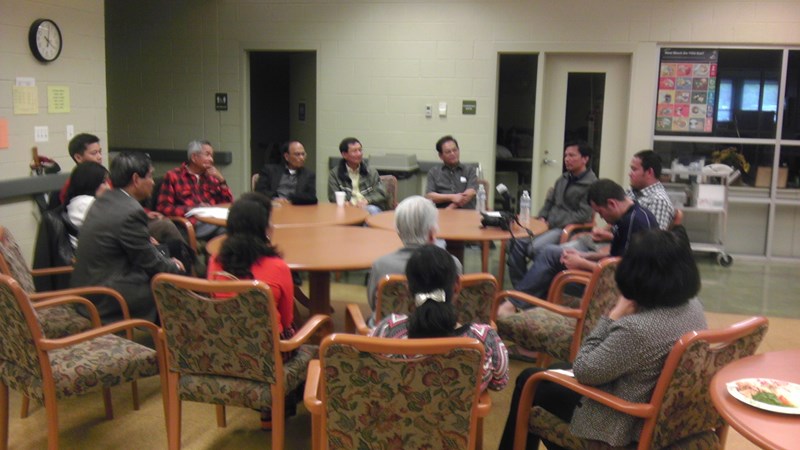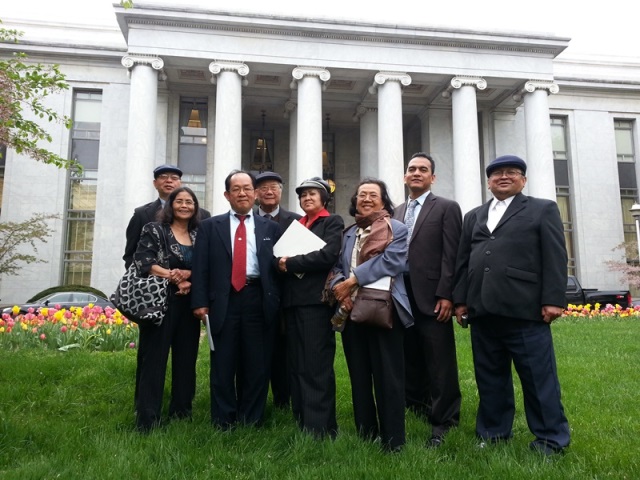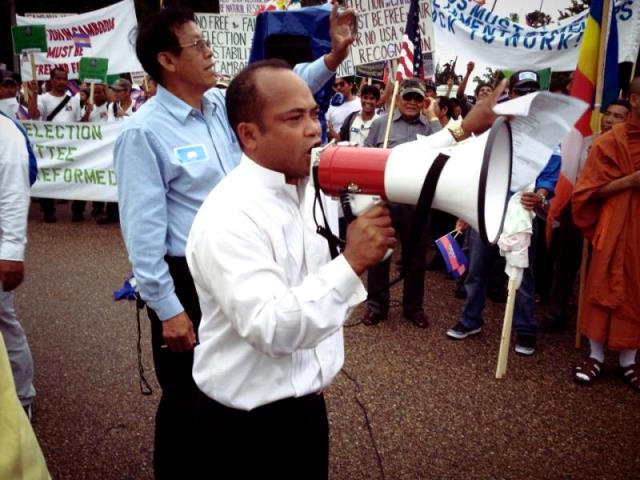[Date As Appropriate]
[Permanent Mission Name]
[Address]
[Address]
[Address]
Dear [Permanent Mission Name]:
We, the undersigned organizations, would like to call the UN Member States’ attention toward the declining human rights situation in Cambodia that has taken place through a wave of politically motivated arrests and detentions. Authorities have continued to detain and prosecute people for expressing negative views of the government, taking part in peaceful activism or human rights work, or associating with the former opposition party, the Cambodia National Rescue Party (CNRP).
Kem Sokha, former president of the CNRP, was arrested in 2017 and still remains unable to leave the country, conduct political activities, and is required to respond if summoned by authorities. He was arrested for a 2013 speech he made in Australia, where he was discussing a strategy to win the next election. The Cambodian Government charged Sokha with conspiring with a foreign power, and, despite Sokha's parliamentary immunity, he was arrested, denied access to fair representation, and held in pre-trial detention which exceeded the maximum period under Cambodian law. While awaiting trial in prison, Sokha had learned that his party and its members, the only legitimate oppositional party recognized by the international communities, was subsequently dissolved by the Supreme Court under Hun Sen’s government. Overnight, more than 5000 legitimately elected communal members of the CNRP found themselves thrown out of their elected positions, banned from political activities for five years, and targeted for arrest or physical abuse, all before Kem Sokha's trial had even begun. This cleared the way for the Hun Sen’s party, the Cambodian People’s Party (CPP), to win 100% of the seats in the 2018 parliamentary elections.
A collective voice from international experts has raised major concern that “the arrest and criminal trial of Kem Sokha were politically motivated,” and surely, Sokha has not been the only victim of Hun Sen’s campaign of political oppression. Cambodian citizens associated with the CNRP, such as Chao Veasna and Keo Thai, have been arrested for merely doing their jobs as local officials and English teachers. Eang Maryna, Khut Chroek, and Ngin Khean have been arrested over Facebook posts criticizing Hun Sen’s management of COVID-19. Thai Sokunthea was arrested for reasons virtually unknown.
Rong Chhun, president of the Cambodian Confederation of Unions, was arrested for asking the government to address the people’s complaints on Radio Free Asia. Two youth environmental activists, Hun Vannak and Chhoeun Daravy, were arrested for asking for Rong Chhun’s release. Three more activists, Thun Ratha, Long Kunthea, and Phoun Keo Reaksmey, were further arrested for their work on behalf of environmental issues.
It is widely recognized in international law that many forms of harsh repression, such as arbitrary long-term imprisonment, executions, and physical assaults, constitute torture under the provisions of the International Covenant on Civil and Political Rights (ICCPR) and the Convention Against Torture. However, these types of punishments have become a key element of the policies and practices of the Cambodian government, as reflected in the treatment of critics and political opponents of the Hun Sen regime. At the forefront of these human rights violations are the brutal physical attacks against members of the National Assembly Nhay Chamroeun and Kong Saphea by members of Hun Sen’s Personal Bodyguard Unit; the assassination of well-known activist Kem Ley; the long-term detention of Meach Sovanarra, the Press Officer for the political opposition; and the subjection of Kem Sokha to long-term house arrest, periodic arbitrary detention, and prosecution for treason. Each must be considered violations of the anti-torture provisions of the ICCPR.
These are just a few people in a long, running list of those who have been arbitrarily arrested and subjugated to human rights violations under Hun Sen’s government. We have compiled numerous cases of Cambodian people who have fallen victim to Hun Sen’s campaign of political oppression. While many have played key roles as former members of the CNRP, some are merely citizens exercising their rights to freedom of expression. In any case, the pattern remains clear—any person who openly critiques and challenges Hun Sen’s regime falls under immediate threat by the government, although it is their right to do so.
On April 29, 2020, in light of the COVID-19 pandemic, the Cambodian government passed the “Law on Governing the Country in the State of Emergency.” This Law grants the Cambodian government the ability to restrict all civil and political liberties, as well as target human rights, democracy, and media groups. While Hun Sen has claimed that this is a necessary response to the COVID-19 pandemic, the implementation of this Law contains many overly broad and vague provisions that allow him to enact absolute power over the Cambodian people—all without specifying why these measures are necessary and proportionate to address the public health emergency.
This Emergency Powers Act presents yet another means for the government to continue cracking down on political opposition members, civil society organizations, and independent journalists and media organizations. Since the pandemic gained widespread traction in March, Cambodian authorities have already arbitrarily arrested at least 30 people, 12 of whom were associated with the CNRP, on charges of spreading “fake news” regarding COVID-19 and alleged incitement and conspiracy. Many of these people were merely sharing information and expressing their concerns over the coronavirus. At least 14 of those arrested were released after being given an official warning and signing a pledge to stop spreading government-deemed “fake news,” while the others remain in pre-trial detention or have been released on bail with charges pending. Of those still being held in pre-trial detention, at least 12 of 14 were associated with the CNRP. This implies that harsher charges are being activated against those associated with the oppositional political party, wrongly justified by means of maintaining social order amid a global pandemic.
Meaningful democracy is not possible when power is retained by silencing legitimate party representation. One of the key elements for the establishment of the current state of Cambodia that was approved by the international community, the United Nations, and the government of Cambodia itself under the terms of the Paris Peace Accords of 1991, was that the principles of democracy and free and fair elections would form the basis for governance and the political process in Cambodia. These principles are further endorsed and protected under Article 25 of the ICCPR. However, by outlawing and closing down the major political opposition party, and by subjecting its leaders and members to harsh physical assaults and threats of arrest, imprisonment and criminal prosecutions, Hun Sen’s government has rejected these principles of democratic governance in favor of a one-party system of authoritarian and dictatorial control.
It is urgent that all governments, the United Nations human rights agencies, and the international community as a whole, speak out forcefully and frequently against the highly repressive actions that these arbitrary arrests represent. In March 2021, Cambodia will undergo a session review in Geneva. We urge the Member States ambassadors to 1) Reiterate these concerns by making an oral statement during this session, and 2) Consider imposing more stringent economic sanctions on trade with the government of Cambodia, to go along with and push for the elimination of “Everything But Arms” favorable trade preferences that the EU recently imposed on Cambodia. The Member States should threaten the stoppage of all trade with Cambodia if they continue the Kem Sokha trial and the other highly repressive policies that they have recently imposed, including the newly adopted national security law that would further entrench these dictatorial policies. These recommendations come in favor of restoring order and democracy to Cambodian society, as well as the reinstatement of key human rights to all.
We, the undersigned people and organizations, continue to condemn these human rights violations enacted by the Cambodian government. We call for the immediate and unconditional release of all political prisoners and others held for the peaceful exercise of their basic rights and urge the Member States to join us in taking action toward these goals.
Joint statement by Cambodian civil organizations residing outside Cambodia:
1. Alliance Cambodge Canada (ACC)
2. Cambodia Border Institute (CBI)
3. Cambodia Women Health Organization (CWHO)
4. Cambodian Alliance for the Paris Peace Agreements on Cambodia (CAPPAC)
5. Cambodian Americans for Human Rights and Democracy (CAHRAD)
6. Cambodian Americans for Human Rights and Democracy League Activist (CAHRADLA)
7. Cambodian Association of Victoria (CAV)
8. Cambodian Australian Federation (CAF)
9. Foundation of Khmer Samaki (FKS)
10. Khmer Alliance Foundation (KAF)
11. Khmer Association of Hampton Road Virginia (KAHRV)
12. Khmer People Network for Cambodia (KPNC)
13. Khmer Unity for Cambodia (KUC)
14. Khmer Veterans Freedom Fighters Association (KVFFA)
15. MeBoun Foundation (MF)
16. Our Mutual National Interests International (OMNI)
17. Overseas Khmer Summit (OKS)
18. Pro Démocratie pour le Cambodge du Canada (PDCC)






